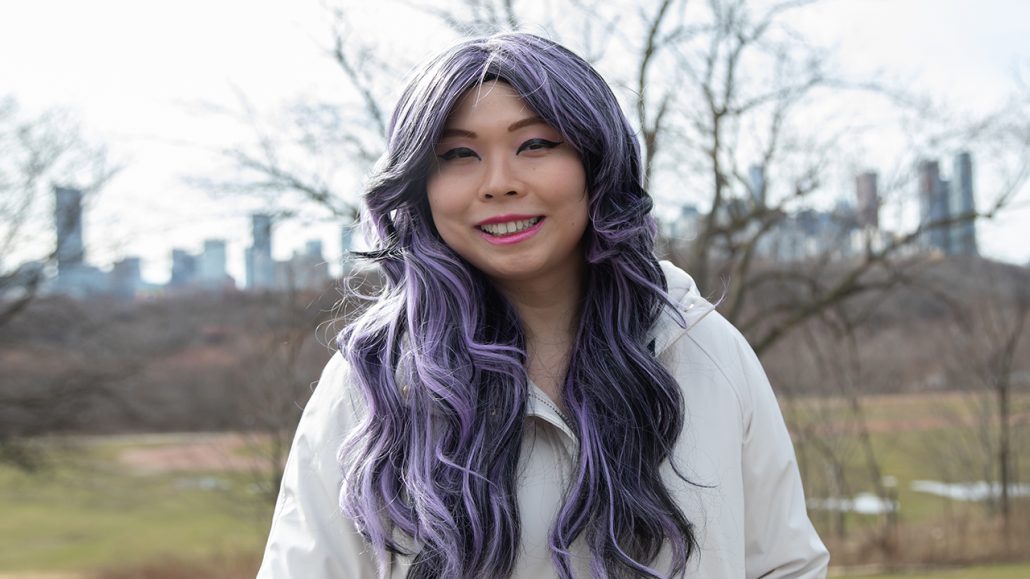
A United Way-funded housing program serving the 2SLGBTQ+ community connected Diana to wraparound support, safe housing and her peers
Diana loves where she lives. She gets along with her roommates, is just down the street from a beautiful park and feels safe in her neighbourhood. But what really makes her house a home is the fact that Diana can be herself there – something that felt out of reach only a few years ago.
Diana is a trans woman, and when she first began transitioning in 2017, her living situation was very different. At the time, Diana was a student at George Brown College figuring out what she wanted to do for a career. She was working in a restaurant kitchen to cover costs, but she was barely getting by. Like so many in the GTA, most of her income went to rent. The rest she used to pay for her medications, with a little left over for groceries and other necessities.
“I used food banks and stuff. I couldn’t do any of the things that support my transition,” she says. “I went to thrift stores to buy clothes I would feel comfortable in, but even that was expensive. It was really hard.”
To make things more challenging, Diana had recently come out to her family and friends, and the experience had left her isolated and afraid to be herself. “I did that, and everybody left me,” she says. Their response made her assume the worst about how others would behave, including her roommates.
“I was living with a lot of people I didn’t know very well. I was scared to go into the kitchen or get the mail or throw out the garbage because I didn’t know how they would react,” she says.
Around this time, Diana started attending a support group and making new friends. After hearing about her living situation, one of them suggested she check out LOFT Community Service’s BLOOM program. BLOOM is one of more than 40 housing programs supported by United Way Greater Toronto. It provides housing and mental health support for adults undergoing gender transition.
Diana applied immediately. Within a few weeks, she’d moved into a house managed by the program. Not only did the move alleviate her financial concerns, it also put her into a far safer space. Her roommates were trans too and understood what she was going through. And staff from LOFT were there to support her.
“It was really good, I had people who cared about me,” she says.
Diana worked with staff to update her IDs, which was a vital step in her transition. “Just having my name on them made me accept myself,” she says. Later, when she underwent gender-affirming surgery, she had someone around to check on her and support her throughout recovery. And when she felt isolated and unhappy during the pandemic, LOFT staff were able to connect her to a therapist.
“I struggle with a lot of mental health issues, but this program saved me. If I wasn’t living in this house, I don’t know that I would still be here,” Diana says.
Diana’s social life has also blossomed since she moved into the house. She and her roommates have beach days in the summer and take cooking lessons together. She also joined a queer badminton league – she played varsity in college – and is looking forward to competing in an upcoming tournament.
“I used to be terrified to talk to other people. There was just a dread,” she says. “Living here gave me confidence to just talk to people outside the house as well. Because I felt accepted for who I am.”
The wraparound support Diana has experienced is an essential part of United Way’s approach. The programs we fund go beyond connecting people to places to live – they also ensure an individual has the resources they need to build a safe and happy life.
And that’s exactly what Diana is doing. She recently attended a job fair through LOFT and is figuring out her career. She’s had a small role on a television show and has modelled in photo shoots, which she enjoyed. But she’s also interested in a job where she could help other people.
She hopes that securing a new job will make it possible for her to one day move into her own place. For now, she’s happy to be in the LOFT house.
“This is a nice home for me. People here are accepting of me, and I feel safe to be here,” says Diana. “Everything has to start with a stable home.”